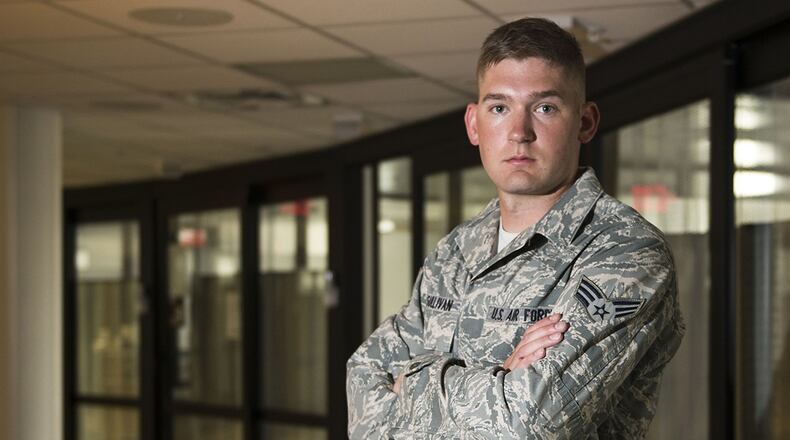There was no hesitation from the respiratory therapist from the 88th Medical Group, Wright-Patterson Air Force Base, who was attached to a Critical Care Air Transportation Team at Bagram, and there were no other medical personnel immediately available to assist in treating wounded personnel.
A trained medic, O’Sullivan raced to the scene to render aid. For what he accomplished that day as he treated the wounded and mustered support from other responders to get the victims to the hospital, O’Sullivan has been named to the 10th volume of the Air Force’s Portraits in Courage, an annual program that highlights individual Airmen and teams for their honor, valor, devotion and selfless sacrifice in the face of extreme danger to themselves and others.
O’Sullivan and 17 other individual Airmen and four teams will be honored Aug. 4 at a luncheon in the Pentagon with senior leadership as well as an evening Heritage to Horizons concert and reception at the Air Force Memorial with Secretary of the Air Force Dr. Heather Wilson and Air Force Chief of Staff Gen. David L. Goldfein.
Prepared and cool under pressure
Prior to joining the Air Force six years ago, O’Sullivan, 27, had been working as an emergency medical technician in and near his hometown of Elizabeth, Illinois, and volunteering for emergency and disaster management relief efforts, such as hurricanes, wildfires, tornadoes and earthquakes, in the southern United States and Haiti.
He said he found his passion for providing medical assistance then and joined the military so he could do even more with his training. He would do so in less than a month into his deployment.
O’Sullivan was about to go to sleep after a night shift that November day when he heard a loud noise outside his dorm. He called the command center, then ran out his door and toward the scene.
He identified himself as a critical care medic to responding security forces personnel and assessed each patient. He then provided initial medical aid while quickly taking steps to open the airways of wounded Soldiers who had suffered penetrating head injuries, a sucking chest wound and an open abdominal wound.
While triaging six patients, he determined that immediate surgical capabilities were required. Although he wasn’t carrying his standard emergency equipment, O’Sullivan did have bandages and shears in his pants pockets, and he used them effectively.
He directed available personnel to load and evacuate the patients to the hospital, using what military police vehicles were nearby.
Within minutes, the site of the attack was clear of casualties and O’Sullivan rode with the last victim in the back of a pickup truck, continuing to control bleeding while stabilizing the patient’s condition.
Once he arrived at the hospital, he assisted with the care of the 17 critically injured patients, providing airway support with oxygenation, hemorrhage control, chest tube insertion and critical intravenous access.
O’Sullivan worked until all critical patients were transported to surgery.
Later that same day, he and his team returned to the hospital to assist in patient transport. They loaded eight critically wounded patients onto a C-17, ensuring their immediate evacuation to Germany to receive higher-level care.
For his efforts, O’Sullivan was awarded the Air Force Commendation Medal for his decisive actions that helped save the lives of 12 U.S. military members and one coalition military member. As a Portraits in Courage honoree, he will become one of 200-some Airmen the Air Force has recognized through this program to date.
Grateful for his training and support
“It’s amazing to get the feedback (about his actions) afterwards, but we were there to support people who were injured,” said O’Sullivan, who returned from his deployment in May. “This is a great opportunity, but I didn’t expect any awards. The drive for me is to better the care I can give to anybody in any kind of situation – whether it be in Afghanistan or Wright-Patterson Air Force Base or the civilian world. I want to help individuals where I can.”
O’Sullivan appreciates his training and said he is thankful for the influence and support of his leadership and the many military members he has encountered.
“These outstanding medical professionals do the same things and have that drive and passion for providing the highest-quality assistance and care, whether the individual is an Airman, Soldier, Sailor or Marine. Those individuals are out there on the front line. It is our honor to take care of them on the way back. It is humbling to be a part of that team.
“The current leaders I have at Wright-Patterson Air Force Base have been amazing mentors, and they put a lot into our Airmen today to make us capable of doing what we can do,” he said.
O’Sullivan gives credit to his team at home, too. When he participates in the Aug. 4 Portraits in Courage events, he will have his “biggest supporter” – wife, Morgan, by his side, leaving their two daughters, ages 4 and 9 months, at home. The proud spouse will celebrate her birthday that day with her heroic husband.
“My wife is the hero. Our second daughter was only two weeks old when I was deployed,” he said. “She raised our kids while I was gone.”
The best news
While it is unusual down range to know how a former patient has done in recovery, O’Sullivan said he was “tagged” on social media after the incident. One of the families of his patients had posted that he had done well with his surgeries and was progressing enough to return to his hometown.
“I was excited to get the news, and I’m glad to see that things were moving forward for that individual’s recovery,” O’Sullivan said. “That’s great.”
About the Author
